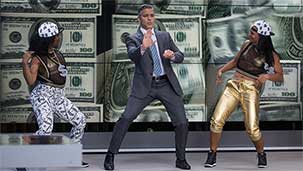You know that little crane you operate for a living? It might look like a crutch, but it’s not. Almost every TV studio has a jib, allowing operators to swing the camera 10 feet in any direction. Used with intelligence and discretion, it helps make a small space feel more dynamicand reduces set-up time between takes. When it’s misused, the overtswoops and swipes cheaply imitate momentum that’s obviously absent from the content. And unfortunately, there’s no jib big enough to have helped Money Monster.
You probably assumed that your job would just be to spoof those fast-paced financial talk shows like Mad Money with Jim Cramer. And to that extent, you are successful. The film takes place almost entirely on the set of a show called Money Monster, where host Lee Gates rope-a-dopes viewers with stock tips and market “insight”. Aside from strange miscasting of George Clooney as Gates, it’s easy to convince us that this type of show could grasp the fleeting attention of ADHD stock market investors watching CNBC or BNN. It’s when director Jodie Foster tries copying the format of a thriller that everything starts to fall apart.
Being held hostage for hours on live TV is a premise that’s hard to swallow at the best of times. But well beyond that, the audience is clearly supposed to feel that Jack O’Connell’s gun-wielding, bomb-strapped hostage-taker is more sympathetic than pathetic. By watering down any psychoses or eccentricities in an attempt to keep the character relatable, the film opens up a logic vacuum that no end goal can fill. He just wants… answers? To why he lost money in the stock market? And then he can die happy? As Jim Kramer would say; BULL!
Motivation issues of the antagonist aside, Money Monster the film suffers from the classic television trappings of being over-lit and overwrought. Even though the movie should be expressing itself in the censorship-free market of the cinema, Foster frames the action too cleanly and forecasts a bloodless battle. She doesn’t allow for the confident pauses that would signal the potential for disaster, nor does she sew enough seeds of doubt or duplicity to make us think anything could happen other than what has been telegraphed in the first 10 minutes. That type of crystal clear semiotic storytelling doesn’t even exist on television anymore, except for maybe the most watered down network procedurals. But something tells me Foster’s goal for the film was the same as her hostage holder – to simply end up playing looped on TV. After all, even Hollywood is losing money these days.
Start looking for a new job, jib.
Sincerely,

Christopher







